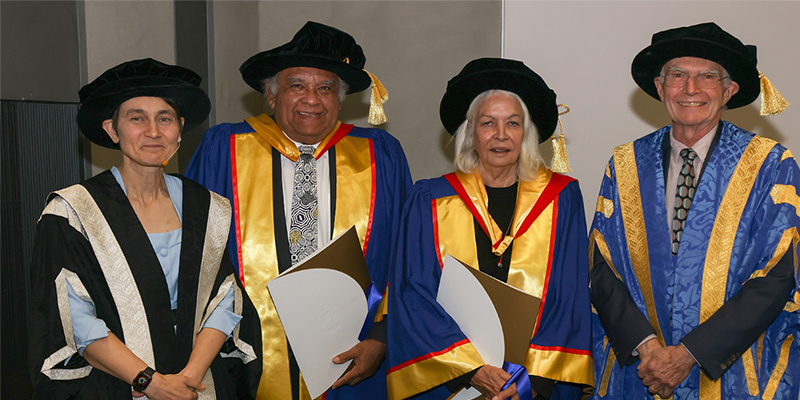Accolades for two influential Aboriginal voices as UniSA endorses wider principle
By Melissa Keogh
 COMMUNITY UniSA Deputy Vice Chancellor Professor Marnie Hughes-Warrington AO, Professor Tom Calma AO, Prof Dr Marcia Langton AO and Deputy Chancellor John Hill at the Honorary Doctorate ceremony.
COMMUNITY UniSA Deputy Vice Chancellor Professor Marnie Hughes-Warrington AO, Professor Tom Calma AO, Prof Dr Marcia Langton AO and Deputy Chancellor John Hill at the Honorary Doctorate ceremony.> UniSA Academic Board supports First Nations Voice to Parliament
Two prominent Aboriginal Australians who were instrumental in co-designing the model for the Voice to Parliament shared their perspectives in an event presented by The Bob Hawke Prime Ministerial Centre at UniSA.
Professor Tom Calma AO and Professor Dr Marcia Langton AO led the discussion The Voice: How the final co-design report enables an effective design for Indigenous advice to the parliament and executive government in May.
After the event, Professor Calma and Professor Dr Langton received Honorary Doctorates from UniSA in recognition of their service to the community.
UniSA Vice Chancellor Professor David Lloyd says both leaders have spent decades as fierce advocates for progress and change in Australia and beyond.
“Our newest honorary doctors have worked tirelessly for the improvement and advancement of Aboriginal Peoples’ rights and empowerment,” Prof Lloyd says.
“They continue to have a significant impact on public discourse and bring attention to the rights, responsibilities, and welfare of Aboriginal Peoples at community, state and international levels.
“We hope their unwavering dedication inspires our students to make their own positive impact on the world and make our communities safer, fairer and more inclusive places to live and thrive.”
Both leaders are major figures in Aboriginal rights and advocacy and are well-known for their contributions to the proposed Voice to Parliament.
They co-authored the Indigenous Voice Co-design Report and are also co-chairs of the Voice Co-design Senior Advisory Group.
The referendum for Australians to vote on whether to enshrine a proposed Voice to Parliament into the Constitution is long overdue but will occur before the end of the year.
In the lead up to the referendum, a divergence of opinions supporting and opposing the Voice are consuming the media, leaving many people undecided and wanting more information.
At the Hawke Centre event, Prof Dr Langton and Prof Calma shared their experiences and explored why the Voice is needed and how it potentially will function. They also addressed some common misinformation surrounding the topic.
Prof Dr Langton is a leading anthropologist, geographer and academic, and is a descendant of the Yiman and Bidjara nations of Queensland. She has devoted her career to advancing the interests of Aboriginal and Torres Strait Islander Peoples.
Prof Dr Langton was a key contributor to the Royal Commission into Aboriginal Deaths in Custody (1989) and the Native Title Act (1993) and has held the Foundation Chair of Australian Indigenous Studies at the University of Melbourne, where she also serves as an Associate Provost.
Prof Calma is an Aboriginal human rights and social justice campaigner who, in 2023, was named Senior Australian of the Year. He is of Kungarakan and Iwaidja heritage from the Darwin region.
Prof Calma is currently Chancellor of the University of Canberra, a professor at the University of Sydney and the National Coordinator for Tackling Indigenous Smoking. He also served as Race Discrimination Commissioner from 2004 to 2009 and Aboriginal and Torres Strait Islander Social Justice Commissioner from 2004 to 2010.
Prof Calma is a graduate of UniSA’s antecedent institution, the South Australian Institute of Technology, and in 2015 was one of the inaugural winners of the UniSA Alumni Awards. He is also a patron of the UniSA Deadly Alumni Association.
UniSA Academic Board supports First Nations Voice to Parliament
UniSA’s Academic Board has unanimously endorsed a motion supporting the principle of enshrining a First Nations Voice to Parliament in the Australian Constitution.
Vice Chancellor Professor David Lloyd says UniSA does not usually hold positions on political issues, however, in the case of the Voice, the University has a deep commitment to Aboriginal education and the advancement of Aboriginal Peoples.
“The Voice is about the principle of recognition of an Aboriginal primacy,” Prof Lloyd says. “Endorsing the Voice is about addressing the questions: should there be a Voice enshrined in our Constitution? Should there be recognition of Australia’s First Nations People in our Constitution?
“Endorsing this principle is consistent with the mission and commitments of our University. However, we firmly respect the right of every individual to their own views on this matter.”
Other Stories
- Australian teachers at breaking point as budget delivers superficial support
- Substandard rental housing a threat to resident health and wellbeing
- Why you should learn the Kaurna phrase Yangadlitya Kumangka
- The WHO says we shouldn’t bother with artificial sweeteners for weight loss or health. Is sugar better?
- From the Vice Chancellor: Universities Accord – What’s the big idea here?
- Achievements and Announcements
- Mother and son pair celebrate graduation from Aboriginal Pathway Program
- From Foundation Studies to PhD and beyond
- Accolades for two influential Aboriginal voices as UniSA endorses wider principle
- In Pictures: MOD. holds its biggest party yet + National Reconciliation Week
- The latest books from UniSA researchers




